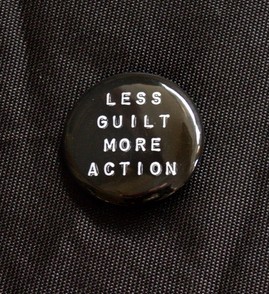Photo Credit: http://www.etsy.com/listing/28805225/less-guilt-more-action-button
Last week I had a cup of tea and a chat with the wonderful Jenny Pickerill and we got on to the subject of guilt. She related how during a lecture to a group of environmental activists she explained that she had “given up guilt”, only to be met with surprise and disapproval: somehow abandoning guilt was akin to abandoning a commitment to activism. Guilt is certainly a prominent feature in environmental discourse, but the notion that guilt is an essential motivator for living well is oddly Catholic. While the relationship between green ideology and religion has been acknowledged previously (Asma 2010), it’s also the case that atheism and self-determination are not alien concepts to progressive movements.
Western privilege and consumer capitalism provide Greens (as well as so many others) with plenty to feel guilty about. Energy use. Food miles. Sweat-shop labour. Carbon footprints. Even our green choices (e.g. public transport), while better than the alternative (e.g. private vehicles), can still be cause for concern (e.g. I should have walked!). The issue with guilt though is whether or not it’s productive. For some, guilt and the associated need to undertake practices of sacrifice are means by which their lived experiences can match their inner ideals, and yet for others guilt is more closely associated with powerlessness. Anyone with even fleeting experiences of depression will likely be familiar with the paralysing impact of guilt. Failure to achieve a goal, regardless of how small it may be (get out of bed today, finish an essay, not eat an entire packet of biscuits in one sitting) most often results in self-criticism and regret rather than a motivating impulse to affect change. How useful is guilt as a motivator if it doesn’t motivate?
In the context of my research, I’m interested in how emotion, and in this case guilt, is gendered. As Erica Jong, in Fear of Flying, provocatively writes “show me a women who doesn’t feel guilty and I’ll show you a man.” Guilt is by no means an innate feeling, but some people in society are socialised to feel it more, to internalise failure and perceived deviance. Perhaps unsurprisingly these people are largely the less powerful because guilt is a weapon of control. For women, pressures to be a perfect mother and raise happy, healthy children induce maternal guilt. Fear of sexual violence and shame relating to sexuality produce guilt relating to behaviour, dress and relationships. Ideals of perfect bodies and managed appearances feed in to guilt about exercise, eating and taking up space. Psychological studies, meanwhile, consistently find women reporting higher levels of guilt and shame than their male counterparts (Lutwak et al 1998; Benetti-McQuoid and Bursik 2005).
What does this all mean for activism, movements, and the individuals that make them what they are? For the moment I have no idea. Or rather lots of ideas that are not yet coherent. But perhaps, if I can stave off the guilt for a little longer, I might be able to make some sense of them.
References:
Asma, S.T. (2010) ‘Green Guilt’ The Chronicle of Higher Education <http://chronicle.com/article/Green-Guilt/63447/>
Benetti-McQuoid, J. and Bursik, Krisanne (2005) ‘Individual Differences in Experiences of and Responses to Guilt and Shame: Examining the Lenses of Gender and Gender Role’ Sex Roles 53(1-2) pp.133-142
Jong, E. (1973) Fear of Flying
Lutwak, N., Ferrarib, J.R. and Cheek, J.M. (1998) ‘Shame, guilt, and identity in men and women: the role of identity orientation and processing style in moral affects’ Personality and Individual Differences 25(6) pp.1027-1036

 RSS Feed
RSS Feed